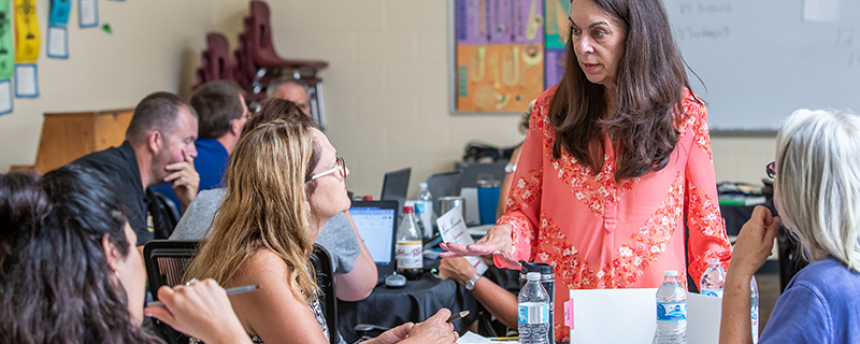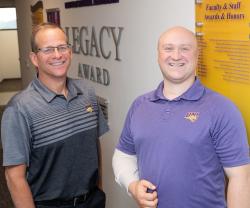Institute for Educational Leadership: Learning and Leading with Character

February 2019. It’s snowing, again. Superintendents, principals and other educational leaders are gathered in a room in Waterloo. In between small group activities and leadership presentations, many participants are on their phones with their teams back in their districts, cancelling school and ensuring students get home safely.
Leader Denise Schares, associate professor, educational leadership, and director of the Institute for Educational Leadership (IEL) for the University of Northern Iowa College of Education, originally scheduled a break outside. But it’s too cold and snowy for that. Thus is born the indoor snowball fight, as part of an activity to review Iowa school leadership standards.
Questions and answers about standards are turned into colored slips of paper. The participants line up, wadded slips in hand, and begin tossing and catching, back and forth. When Schares calls time, the group gathers in a circle. Individuals share a question, prompting the search for the right answer gathered in the snowball session.
When life hands you snowstorms, improvise.
While there is much more to the IEL leadership camps, the perseverance demonstrated that snowy day reflects the commitment to learn and lead with character shown by both instructors and participants from school districts across Iowa.
Helping leaders grow
The educational leadership faculty at the UNI College of Education have been guiding administrative growth through professional development for educators for years. IEL began with a partnership with the Iowa Superintendents Finance and Leadership Consortium (ISFLC) 20 years ago. About four years ago, two one-day think tanks for superintendents were added twice a year. In 2018, IEL piloted a two-day leadership camp for principals. Then the IEL received a four-year, $663,940 grant from the Kern Family Foundation.
The Learning and Leading with Character program, funded by the grant, supports superintendents, principals and school boards, giving them skills and knowledge to positively impact schools and communities, with an emphasis on rural districts.
“This is about giving people opportunities to come together and collaborate, with the end result to make good decisions for kids,” says Schares, who has served as IEL program director for six years, taking over when Dave Else retired.
This gift has allowed the institute to expand its offerings. A scaled-up effort now includes:
- Think tanks -- Eight one-day regional programs per year, expanded to include principals and superintendents.
- Leadership camps -- Eight or more two-day camps serving principals and superintendents.
- School board dialogues -- Five workshops for school board members and superintendents per year.
- Mentor training -- Three workshops for superintendent and principal mentors per year.
- ISFLC -- continuing two conferences per year, connecting with 200 leaders.
A broadened focus
Superintendents were the focus of early programs, but principals are now part of the mix, outside of the school board sessions. The goal is to connect with at least 800 educational leaders by 2022, with 75% in rural districts. While each program offers a different learning opportunity, a common thread is bringing together peers to learn from the program and one another.
The leadership camps focus on facilitated processes to examine the six Iowa Standards of School Leaders, supporting the required evaluator renewal. For school boards, UNI faculty engage board members in discussion on the ethics standard and how that relates to board policy and members’ interaction with their communities.
“Everybody brings a challenge to the table, and then they go through a protocol to have conversations. People said they couldn’t believe the level of conversation. They were just really appreciative of the attention to their challenge and the support for resolving,” she says.
The IEL plans to share what it learns. “Part of our goal is dissemination. We’ve submitted to a number of conferences and have been accepted for presentations,” she says. “For any college or university providing leadership training, there is great potential here. Even though there may be different leadership or school board standards in their states, we are creating dialogue guides and crafting questions that we believe anyone could use.
“So far the questions about the program have really been on the potential of replicating this work and what is making it well received by people in the field,” she adds. “I think part of it is credibility; our team has credibility. We’ve all been leaders, we’ve been in the field, so I think that’s important in replicability.:
Before launching expanded programming in early 2019, Schares and her UNI colleagues spent six months focused on evaluation, working with the UNI Center for Social and Behavioral Research. “Every time we get feedback, we want to utilize that feedback to make changes. We want to get better and better at what we’re doing and improve even further in delivery and support we’re providing leaders.”
The value of connecting
Schares, a former superintendent herself, enjoys supporting UNI graduates and fellow administrators, and sees value in every session she leads.
“This has really illuminated for me the need for high quality professional development and, most importantly, how isolated, both geographically and positionally, people can be. When you’re the superintendent, it might be miles between your nearest colleague. You can call and email, but the ability to come together is such a need, even more so than I imagined,” says Schares.
“How can we foster learning conversations and support growth to lead and learn with character?” she adds. “It keeps coming back to that.”
The weather has turned. Principals and superintendents gather on a muggy, partly sunny day in June at Prairie Lakes Area Education Agency in Pocahontas for an IEL leadership camp. Ten men and 10 women represent mostly north central and northwest school districts. The morning includes sharing personal articles that reflect Standard 5 on ethics and integrity. After lunch, they’ll have their “snowball fight,” and then role play as principals and superintendents before debriefing and heading home.
Comments throughout the day reflect time well spent:
“The standards are one of those things you look at once a year, but the last two days, we dove into them deeper for a better understanding, learned some strategies and tools, and it’s made it more like a living, breathing document all year.”
“I appreciate the essential question: How do we lead with character? And I appreciate Denise’s intentionality with use of protocols. We know that traditional teaching works for some populations, but if you want to reach a more diverse group of people, we need more. I appreciate Denise’s modeling of that.”
“The professional collaborations have been priceless.”
Welcome to EPFLS
 Effective July 1, everyone has a new department acronym to remember: EPFLS, or Educational Psychology, Foundations and Leadership Studies.
Effective July 1, everyone has a new department acronym to remember: EPFLS, or Educational Psychology, Foundations and Leadership Studies.
EPFLS represents the consolidation of the former Department of Educational Psychology and Foundations and Department of Educational Leadership and Postsecondary Education. Benjamin Forsyth, Ph.D., is the new department head while Timothy Gilson, Ed.D., serves as assistant department head.
Forsyth, an associate professor, previously served as head of educational psychology and foundations, while Gilson was the interim head of educational leadership and postsecondary education.
This merger brings together two areas with longstanding ties in the college. Educational psychology and foundations was one of the three departments created in 1970 as education transitioned into a college. Another of those three was school administration and personnel services, which was renamed and organized again in 1983 and 2000.
Forsyth earned an undergraduate degree in physics teaching and taught high school before completing his doctorate in educational psychology and educational technology. He admits that early in his studies, he had little interest in administration. He has since he learned through experience.
“I have helped with team teaching for educational leadership on a different couple of courses. I have heightened respect and admiration for what school leaders do in their educational endeavors,” he says. “I myself have come to love being in leadership positions. I like the service component of it. As a department head, I can clear the way for other people’s great ideas, and I really enjoy that.”
While looking forward to new responsibilities, Forsyth values the leadership that Gilson will continue to provide as well.
“It is so important that the educational leadership and postsecondary perspective doesn't get lost. We want to preserve the good things that were happening already,” he says. “We are becoming one department, but that requires that we continue the past. Tim is an excellent colleague and I know he’ll make sure we're taking care of leading those programs to the best of our ability.”
EPFLS faculty connect with nearly 2,000 undergraduates annually while leading four courses within the professional core sequence required of all UNI education students, PreK-12. At the graduate level, the new department is home to several highly regarded programs:
- School psychology
- Principalship/Superintendency master’s and certificate programs
- International teacher leadership
- Postsecondary education: student affairs
EPFLS also coordinates the intensive study area in educational administration, part of the College of Education’s doctoral program leading to the Ed.D.
“Our faculty’s efforts have an overarching impact across the majority of educator preparation at UNI,” Forsyth says.
With the program’s reputation to uphold, he confidently looks ahead. “The principalship has grown from two to three cohorts. We’re the only school psychology program in the state,” Forsyth says. “We have a lot going for us, with the strength and health of our programs. We are definitely taking two healthy departments and making them even stronger.”
Skaar advocates for school psychology
Nicole Skaar happens to be the president of the Iowa School Psychologists Association. That didn’t make her any less surprised when she humbly received the Iowa School Psychologist of the Year award at ISPA’s spring workshop in May.
“This award means that, as an association, ISPA is becoming more visible, and we’re beginning to meet the advocacy needs of school psychologists in the state, which are things I’ve been working on. This acknowledgement says to me we're headed in the right direction,” she says.
Skaar serves as program coordinator for the only active graduate program for school psychology in Iowa. The UNI School Psychology Program admits 10 students each year and graduates enjoy 100 percent placement in employment. Still, multiple positions remain unfilled in the state.
“The growing focus on children’s mental health has alerted people to the growing need for mental health professionals in schools -- and school psychologists are mental health professionals who are trained to work in schools,” she says.
School psychologists are trained in both psychology and education, with a focus on children. For Skaar, after a journey that included a psychology degree, thoughts of medical school, and a shift to clinical psychology, she discovered school psychology. It brought together her desire to work with children and to use data as part of evidence-based solutions and interventions for individuals and systems.
Skaar teaches, conducts research and regularly advocates for the UNI program and the field. “If you want to focus your career on children and families, you’re interested in education or psychology, or interested in using data to solve problems, school psychology could be a great fit.”
